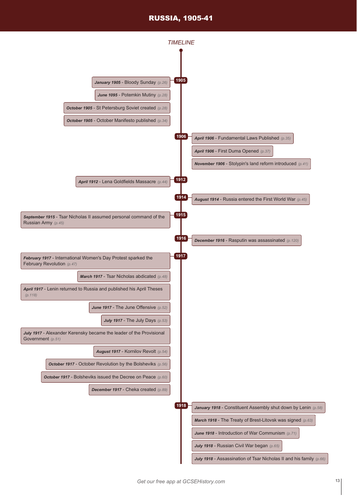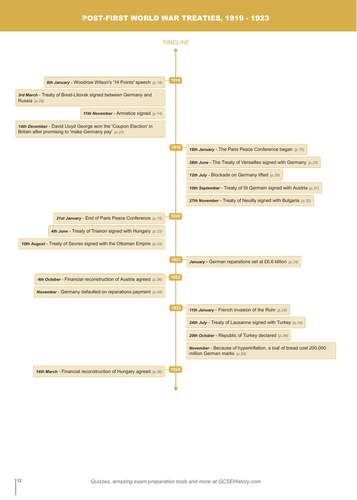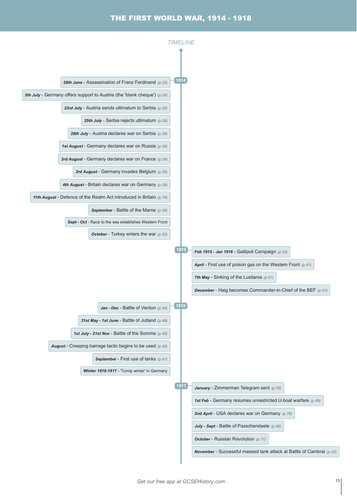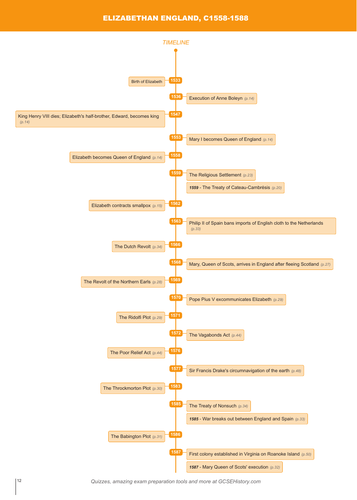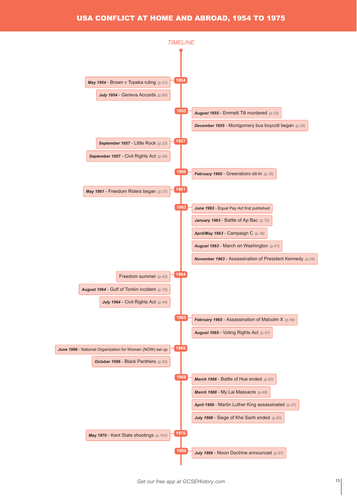112Uploads
32k+Views
15k+Downloads
All resources

Glossary - Edexcel GCSE Crime and Punishment in Britain, c1000-Present and Whitechapel, c1870-c190
This glossary is an extract from from a Study Guide by Clever Lili.[https://www.gcsehistory.com/bookstore/ed_gcse_crime_and_punishment.html]
Edexcel GCSE Crime and Punishment in Britain c1000 - Present is a thematic study that looks at the change and continuity of crime and punishment across a broad sweep of British history. You will look at the main people, events and developments, as well as significant features of the different ages, from medieval to modern times. In studying Whitechapel, you will investigate a historic environment that was significant to crime and punishment and the events and developments that occurred there.

Glossary - CIE Germany, 1918 - 1945
This glossary is an extract from from a Study Guide by Clever Lili.[https://www.gcsehistory.com/bookstore/cie_igcse_germany_1918_to_1945.html]
CIE Germany, 1918-45 is a depth study that investigates how Germany became a democratic republic before being transformed into a dictatorship. The course focuses on the origins of the Weimar Republic, the challenges it faced and to what extent it overcame those challenges. The course also investigates why and how the Weimar Republic was dismantled by the Nazis, replaced by a dictatorship and then changed by the Second World War. You will focus on the crucial events and people of this period, as well as studying the different social, cultural, polical, economic, military and religious changes that occurred.

Glossary - AQA Germany, 1890–1945: Democracy and Dictatorship
This glossary is an extract from from a Study Guide by Clever Lili.[https://www.gcsehistory.com/bookstore/aqa_gcse_germany_1890_45.html]
Germany 1890-1945: Democracy and Dictatorship, is a period study that investigates Germany’s journey from an Imperial power to a democracy, and then investigates how it was transformed into a dictatorship. The course focuses on the relatively new German Empire and its early problems, culminating in the First World War. The course also investigates the origins of the Weimar Republic, its challenges, and how it sought to overcome those challenges. You will study a range of significant events, people and situations, which shaped the German landscape throughout this tumultuous time period, and you will look at the significant shifts in German society from internal and external pressures.

Glossary - AQA Conflict and Tension: the Inter-War Years, 1918–1939
This glossary is an extract from from a Study Guide by Clever Lili. [https://www.gcsehistory.com/bookstore/aqa_gcse_conflict_tension_1918_39.html]
AQA Conflict and Tension 1918-1939 is an AQA wider world depth study that investigates international relations. The course focuses on what caused the Second World War. It considers how and why the war happened, and why it was so challenging to find resolutions to the issues which caused it. You will study the roles of key individuals and groups in influencing change, and how they were affected by and shaped by international affairs.

Glossary - CIE China, c1930-1990
This glossary is an extract from from a Study Guide by Clever Lili.[https://www.gcsehistory.com/bookstore/cie_igcse_china_1930_1990.html]
CIE The China, 1930-1990 course investigates the major changes in China during the 20th century. The course focuses on the causes, course and consequences of the Chinese communist revolution during this period. You will study the different political, economic, social, international and military changes that occurred as a result of this event.

Glossary - AQA Britain: Health and the People, c1000 to the Present Day
This glossary is an extract from from a Study Guide by Clever Lili.[https://www.gcsehistory.com/bookstore/aqa_gcse_medicine.html]
AQA Britain: Health and the people: c1000 to the present day, is a thematic study that looks at the change and continuity of medicine through British history. You look at the main people, events and developments, as well as the significant features of the different ages, from medieval to modern times.

Glossary - AQA Conflict and Tension: The First World War, 1894–1918
This glossary is an extract from from a Study Guide by Clever Lili. [https://www.gcsehistory.com/bookstore/aqa_gcse_conflict_and_tension_1894_to_1918.html]
AQA Conflict and Tension 1894-1914: the First World War is a wider world depth study that investigates international relations. The course focuses on the causes and course of the First World War. It considers how and why the conflict occurred, as well as why it lasted so long.

Glossary - AQA Britain: Power and the People, c1170 to the Present Day
This glossary is an extract from from a Study Guide by Clever Lili.[https://www.gcsehistory.com/bookstore/aqa_gcse_power_and_the_people.html]
AQA Power and the people 1170 to the present day is a thematic study. The course focuses on key events in British history and how they have affected the relationship between the government, the monarchy and the citizen. You will study key events, key individuals and the ideas that have contributed to the development of the Britain we know today.

Glossary - AQA America, 1840–1895: Expansion and Consolidation
This glossary is an extract from from a Study Guide by Clever Lili. [https://www.gcsehistory.com/bookstore/aqa_gcse_america_1840_1895.html]
AQA America, 1840–1895: Expansion and Consolidation, is a period study that investigates two aspects of the history of the United States in the second half of the nineteenth century. ‘Expansion’ explores the move westwards by settlers and pioneers, and the ensuing conflicts with Native American peoples. ‘Consolidation’ refers to the forging of the United States as a nation, through its political and economic growth. You will study a range of significant events, people and situations, which shaped the United States throughout this period.

Glossary - AQA Russia, 1894–1945: Tsardom and Communism
This glossary is an extract from from a Study Guide by Clever Lili.[https://www.gcsehistory.com/bookstore/aqa_gcse_russia_tsardom_and_communism_1894_1945.html]
AQA The Russia, 1894-1945: Tsardom and communism course is a period study. The course focuses on key events in the history of Russia during a chaotic half century and the development of communism through the period. You will study key events, key individuals and the social, economic, political and cultural impact of these changes.

Glossary - AQA Conflict and Tension between East and West, 1945–1972
This glossary is an extract from from a Study Guide by Clever Lili. [https://www.gcsehistory.com/bookstore/aqa_gcse_conflict_45_72.html]
AQA Conflict and Tension between East and West 1945-1972 is a wider world depth study that investigates international relations. The course focuses on the causes and course of the Cold War. It considers why the conflict occurred, as well as how it developed into a global conflict over the following quarter of a century.

Glossary - AQA Norman England, c1066–c1100
This glossary is an extract from from a Study Guide by Clever Lili.[https://www.gcsehistory.com/bookstore/aqa_gcse_norman_england.html]
AQA Norman England, 1066-c.1100 is a British depth study that investigates how England changed and developed following the Norman Conquest in 1066. The course focuses on the period from 1066 to the years around the accession of Henry I in 1100. You will focus on crucial events during this period, and study the different social, cultural, political, economic and religious changes that occurred. You will also investigate a specific historical site in detail to examine the relationship between the site and events during this time period.

Glossary - AQA Britain: Migration, Empires and the People, c790 to the Present Day
This glossary is an extract from from a Study Guide by Clever Lili.[https://www.gcsehistory.com/bookstore/aqa_gcse_mep.html]
AQA Migration, empires and the people, c.790 to the present day, is a thematic study. The course focuses on key events in British history and how they have affected Britain’s position in the world, and migration to and from Britain. You will study key events, key individuals, and the ideas that have contributed to the rise and fall of the Britain Empire, and shaped the Britain we know today.

Medieval Medicine -AQA, Edexcel
Medicine was slow to advance in medieval times because people didn’t have the knowledge to help them understand the human body. This period was characterised by inaccurate explanations for illness, based on superstition and religion.

Elizabeth I’s problem with religion
Religion was very problematic for Elizabeth as it was very divisive in her subjects’ lives. This is because Protestant ideas ultimately challenged the authority of the Roman Catholic Church. Elizabeth tried to appease everyone by offering a ‘middle way’ compromise.

Timeline - CIE Russia, 1905 - 1941
This timeline is an extract from from a Study Guide by Clever Lili.[https://www.gcsehistory.com/bookstore/cie_igcse_russia_1905_to_1941.html]

Timeline - CIE International Relations: Were the Peace Treaties of 1919–23 Fair?
This timeline is an extract from from a Study Guide by Clever Lili.[https://www.gcsehistory.com/bookstore/cie_igcse_international_relations_versailles_settlement.html]

Timeline - Cie The First World War, 1914 - 1918
This timeline is an extract from from a Study Guide by Clever Lili.[https://www.gcsehistory.com/bookstore/cie_igcse_ww1.html]

Timeline - Edexcel GCSE Early Elizabethan England, 1558–88
This timeline is an extract from from a Study Guide by Clever Lili.[https://www.gcsehistory.com/bookstore/ed_gcse_elizabeth.html]

Timeline - Edexcel GCSE The USA, 1954–75: Conflict at Home and Abroad
This timeline is an extract from from a Study Guide by Clever Lili.[https://www.gcsehistory.com/bookstore/ed_gcse_usa_conflict_at_home_abroad.html]
















